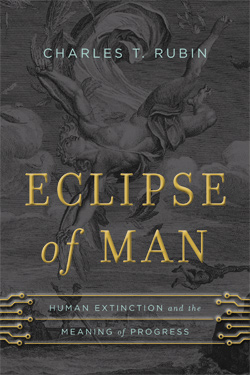“Nano-utopia — the redesign of the body — the biochemistry of bliss — the immortality of an uploaded mind — the coming Singularity. It’s tempting to dismiss transhumanism as wacky. Charles T. Rubin shows why we should take seriously this most radical aspiration to go beyond man. Rubin uncovers the surprising and complex genealogy by which the quest for human betterment became a nihilistic embrace of human extinction. Drawing on works of the imagination from classical mythology to science fiction, from painting to movies to literature, Rubin sketches a philosophically deep response to the might-makes-right premise of transhumanism. He offers a more charitable view of abiding human imperfection — a view that welcomes change while affirming the continuity of the human condition. With clarity and beauty, Rubin defends the good of being human. ”
— Diana Schaub, Professor of Political Science, Loyola University Maryland

